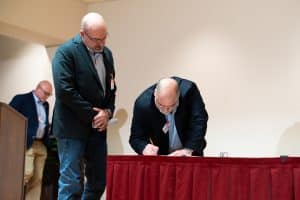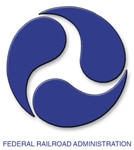SMART Transportation Division began a new era in rail safety and worker protection by working with Norfolk Southern to accept and act on anonymous safety reports.
How it Works
The one-year pilot program, called the Close Call Reporting System (C3RS), is similar to one airline personnel use to hold their airlines accountable. Rail workers will share safety concerns through a secure website. NASA, acting as an independent party, will organize, anonymize and share the reports with the FRA. Under FRA guidance, improvements will be made by a joint committee including SMART-TD representatives, other rail labor and Norfolk Southern management.

A Long Time Coming
C3RS first came to the rail industry in 2007 when SMART-TD predecessor UTU and Union Pacific participated in an early version, running until 2013. They piloted the system in Bailey Yard, North Platte, Nebraska, the largest rail yard in the world. The program was highly successful; it increased safety, reduced critical incidents and rule violations. The program also greatly reduced employee discipline. Other Class III and passenger rail carriers began to benefit from the system around the same time.
The program requires voluntary agreement among the rail carrier, labor and the federal government. Despite the program’s success, UP refused to renew the program, effectively killing it. SMART-TD has engaged in an ongoing effort to reintroduce the program at all Class I carriers.
We Have Only Begun to Fight
After our 17-year effort, Norfolk Southern has decided to take the lead on rail safety and this C3RS agreement shows that CEO Alan Shaw is serious in his commitment to making NS the safest railroad by partnering with rail labor. SMART-TD President Ferguson, and General Chairpersons Tommy Gholson, James Ball, David Phillips, Dan Weir and Joe Borders began making real progress with NS executives in 2023, resulting in a signed agreement on February 15, 2024.
“For years we’ve watched the successes of the several short lines that have practiced under C3RS and because of that, for years, we’ve long been advocates,” said Gholson, who was instrumental in negotiating the pilot program.
Gholson also praised the efforts of the four other general chairpersons for their roles in constructing the C3RS framework. Alt. National Legislative Director Jared Cassity provided leadership by being a facilitator in the process and coordinating with the FRA.
SMART-TD: Out in Front
In a speech soon after the agreement’s signing, SMART-TD President Jeremy Ferguson said: “Rail labor has been out in front since the beginning. We have always advocated for the right to have a protected avenue to report safety concerns and injuries without fear of harassment, intimidation, or retribution.
“For far too long, this nation’s rail carriers have been complacent with their approach to safety. Obviously, this is something that can’t be reversed overnight, but we are hopeful that the corrective process can begin with a program like C3RS.
“There is no higher priority for SMART TD or the workers we represent than safety, not just for their own welfare but also for the communities in which they operate.”
 Officials from the Massachusetts Bay Transportation Authority (MBTA), Keolis Commuter Services, the Federal Railroad Administration (FRA) and four labor unions signed an agreement May 8 that would implement a federal close-call reporting system designed to improve safety.
Officials from the Massachusetts Bay Transportation Authority (MBTA), Keolis Commuter Services, the Federal Railroad Administration (FRA) and four labor unions signed an agreement May 8 that would implement a federal close-call reporting system designed to improve safety.